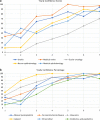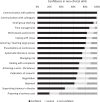Ophthalmology specialist trainee survey in the United Kingdom
- PMID: 30710112
- PMCID: PMC6707274
- DOI: 10.1038/s41433-019-0344-z
Ophthalmology specialist trainee survey in the United Kingdom
Abstract
Background: Currently there are a total of 780 post-graduate ophthalmology trainees in the United Kingdom (UK). Post-graduate ophthalmology training in the UK is 7 years in duration, and follows a comprehensive competency-based curriculum. Changes to training have been proposed as part of the government's Shape of Training paper.
Methods: UK ophthalmic trainees and trainers, in partnership with the Royal College of Ophthalmologists, designed a national questionnaire to explore the confidence of trainees in different clinical and non-clinical aspects of ophthalmology. The questions and possible responses underwent a process of refinement through the Royal College of Ophthalmologists Training Committee and Trainee Group. An online survey platform was used for the questionnaire, which was sent to all ophthalmology trainees within the UK. Reminders were sent via the Royal College of Ophthalmologists and Regional Training Programme Directors. A 4-week period was allowed for responses. Quantitative data were analysed, and qualitative data analysis included collation and thematisation of free-text responses.
Results: A total of 188 trainees (24.1% response rate) replied. Ninety-four percent of trainees were in full-time training posts. The most popular career choice was oculoplastics (31.4%), followed by vitreo-retina (25.1%), glaucoma (24.6%) and cornea (24.0%). One-quarter had opted out of the European working time directive (EWTD), and 54.8% agreed that their work contract reflected the number of hours actually worked. In total, 34.4% of trainees thought that ophthalmic specialist training should be shortened from the current 7-year programme. Overall, 79.9% of respondents felt confident in performing phacoemulsification cataract surgery independently. For more senior trainees in years 4-7, 100% felt confident in phacoemulsification. However, overall, only 47.9% were confident in independently performing an anterior vitrectomy (91.1% of final-year trainees). Overall, 77.6% thought that all surgical ophthalmologists should be trained to perform cataract surgery. For non-clinical skills, trainees felt least confident in 'preparing a business case', with 64.5% disagreeing that they felt confident in this task. The most confidence was felt for communication with patients: 100% of trainees (all of whom have completed at least 2 years of medical work following qualification) reported feeling confident.
Conclusions: Most doctors in post-graduate specialist training in ophthalmology in the UK aim to specialise in surgical sub-specialities. The subjective reports collected in this survey suggest targets for strengthening of the UK's highly rated training system. Further research is necessary to determine overall satisfaction with training, the effect of changing training within the recent Shape of Training review; and how recent newly imposed junior doctor contracts as well as Brexit affects training.
Conflict of interest statement
The authors declare that they have no conflict of interest.
Figures
Comment in
-
Comment on: 'Ophthalmology Specialist Trainee Survey in the United Kingdom'. The need to increase familiarity with the management of predictable cataract surgery complications via simulation-ensuring competence to improve confidence.Eye (Lond). 2020 Sep;34(9):1713-1714. doi: 10.1038/s41433-019-0673-y. Epub 2019 Nov 21. Eye (Lond). 2020. PMID: 31754281 Free PMC article. No abstract available.
-
Response to 'Comment on: ophthalmology specialist trainee survey in the United Kingdom'.Eye (Lond). 2020 Sep;34(9):1715. doi: 10.1038/s41433-019-0725-3. Epub 2019 Dec 11. Eye (Lond). 2020. PMID: 31827268 Free PMC article. No abstract available.
Similar articles
-
Confidence of ophthalmology specialist trainees in the management of posterior capsule rupture and vitreous loss.Eye (Lond). 2016 Jul;30(7):943-8. doi: 10.1038/eye.2016.55. Epub 2016 Apr 15. Eye (Lond). 2016. PMID: 27080483 Free PMC article.
-
The impact of the European Working Time Regulations on Ophthalmic Specialist Training--a national trainee survey.Int J Surg. 2013;11(9):837-40. doi: 10.1016/j.ijsu.2013.08.007. Epub 2013 Aug 28. Int J Surg. 2013. PMID: 23994298
-
Educational Value of Surgical Multidisciplinary Team Meetings for Learning Non-Technical Skills - A Pilot Survey of Trainees From Two UK Deaneries.J Surg Educ. 2019 Jul-Aug;76(4):1034-1047. doi: 10.1016/j.jsurg.2019.02.001. Epub 2019 Feb 19. J Surg Educ. 2019. PMID: 30792161
-
Selection, teaching and training in ophthalmology.Clin Exp Ophthalmol. 2005 Oct;33(5):524-30. doi: 10.1111/j.1442-9071.2005.01089.x. Clin Exp Ophthalmol. 2005. PMID: 16181283 Review.
-
Definition and Perception of Autonomy in Vascular Surgery Training.Ann Vasc Surg. 2024 Sep;106:51-60. doi: 10.1016/j.avsg.2024.01.005. Epub 2024 Apr 3. Ann Vasc Surg. 2024. PMID: 38579909 Review.
Cited by
-
Have gender and ethnic disparities in ophthalmology disappeared? Insights from a workforce-based study in Israel (2006-2021).Isr J Health Policy Res. 2025 Jan 10;14(1):2. doi: 10.1186/s13584-024-00664-2. Isr J Health Policy Res. 2025. PMID: 39794800 Free PMC article.
-
The adoption of deep learning interpretability techniques on diabetic retinopathy analysis: a review.Med Biol Eng Comput. 2022 Mar;60(3):633-642. doi: 10.1007/s11517-021-02487-8. Epub 2022 Jan 27. Med Biol Eng Comput. 2022. PMID: 35083634 Free PMC article. Review.
-
Comment on: 'Ophthalmology Specialist Trainee Survey in the United Kingdom'. The need to increase familiarity with the management of predictable cataract surgery complications via simulation-ensuring competence to improve confidence.Eye (Lond). 2020 Sep;34(9):1713-1714. doi: 10.1038/s41433-019-0673-y. Epub 2019 Nov 21. Eye (Lond). 2020. PMID: 31754281 Free PMC article. No abstract available.
-
Confidence of UK Ophthalmology Registrars in Managing Posterior Capsular Rupture: Results from a National Trainee Survey.Ophthalmol Ther. 2022 Feb;11(1):225-237. doi: 10.1007/s40123-021-00425-3. Epub 2021 Nov 19. Ophthalmol Ther. 2022. PMID: 34799828 Free PMC article.
-
Returning to cataract surgery after a hiatus: a UK survey report.Eye (Lond). 2022 Sep;36(9):1761-1766. doi: 10.1038/s41433-021-01717-5. Epub 2021 Aug 6. Eye (Lond). 2022. PMID: 34363047 Free PMC article.
References
-
- RCOphth. Workforce Census 2016 [https://www.rcophth.ac.uk/wp-content/uploads/2017/03/RCOphth-Workforce-C...; accessed 10 June 2018].
-
- Kennedy C. Specialty Training Applications for Entry in 2016: Competition Ratios and the Application Process. BMJ. 2015;351. JSTOR, https://www.jstor.org/stable/26524510.
-
- GMC. Training environments 2017: key findings from the national training surveys. 2017 [https://www.gmc-uk.org/key-findings-31410.asp?utm_source=gmcnews_doctors...; accessed 27 November 2017].
-
- Smith JA. Re: A response to European working time directive and surgical training. An open letter to the presidents of the Surgical Royal Colleges and Programme Directors of Higher Surgical Training. Response from D. Rowley, Director of Education, Royal College of Surgeons of Edinburgh. Surgeon. 2004;2:358. doi: 10.1016/S1479-666X(04)80038-6. - DOI - PubMed
MeSH terms
LinkOut - more resources
Full Text Sources




